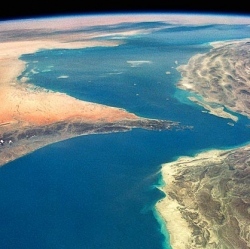
Jeff Bezos has kept his rocket company, Blue Origin, largely under wraps since he founded it in 2000. But Blue Origin announced Tuesday that it is planning unmanned test flights of its new engine and cargo capsule later this year.
The company’s New Shepard reusable capsule is designed to eventually carry tourists and science experiments to the edge of space. The unmanned tests, set for later this year, will involve launching the cargo vehicle to just above the 62-mile lip of space. The booster rocket will drop away and attempt to land vertically at Blue Origin’s launch site in Texas. The New Shepard capsule will hang weightless for a few minutes before falling back to Earth, slowed by a parachute. While Blue Origin eventually wants to fly farther into space, this suborbital height is a perfect entry point for the company’s space tourism plans.
Blue Origin is touting the "deep throttling" ability of its hydrogen-fueled BE-3 rocket engine. The so-called deep throttling allows the engine to burn anywhere from full-blast 110,000 pounds of thrust, down to 20,000 pounds of thrust, a range that provides enough propulsion for vertical takeoff and enough control for a vertical landing, Blue Origin president Rob Meyerson told reporters.
Private space companies, including Blue Origin and SpaceX, have been researching and testing reusable rockets as a way to drastically cut costs. Landing a rocket after a launch, as opposed to trashing it by letting it fall into the ocean, could cut launch costs by a factor of 100, says SpaceX founder Elon Musk. SpaceX this year has attempted to land its Falcon 9 rockets on a barge in the ocean, with fiery results. Richard Branson’s Virgin Galactic, on the other hand, plans to use its WhiteKnightTwo carrier plane to fly into sub-orbit before launching its LauncherOne rocket.
